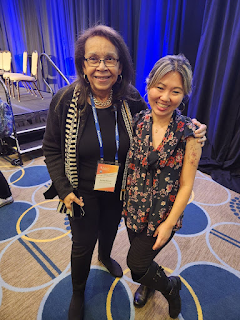Physics and Astronomy (P/A) SEA Change has been up to quite a bit since our initial AAS CSWA blog article and the cross-post from the SPS Radiations magazine. If you don’t remember, SEA = STEMM (two Ms- one is for “medicine”) Equity Achievement (SEA).
The broader SEA Change goal is to support continual, data-informed systemic change regarding equity, diversity, and inclusion (EDI) in postsecondary STEMM education acad The SEA Change process entails undergoing a comprehensive self-assessment for populations (i.e., students, faculty, staff) and disaggregating the data (when possible) especially for race, gender, and intersections of these identities, among other demographics. Topics include policies, procedures, recruiting strategies, culture, climate, and outcomes. Both qualitative and quantitative data are used to understand the context. After looking at the data and considering what is possible in one’s given context, a 5-year action plan is created. The action plan needs metrics to ensure specified actions are indeed improving some aspect of equity, diversity, and inclusion. The action plan, along with a narrative that describes what was learned, is reviewed. If awarded with a Bronze Award, the action plan is implemented. At the end of 5 years, the department can reapply for the award.
You may be familiar with the American Association for the Advancement of Science (AAAS). Institutional SEA Change. P/A SEA Change works in partnership with AAAS (and in collaboration with AAS) and has launched the first disciplinary award pilot.
Milestones and developments
The SEA Change process, for institutions and disciplines, is not prescriptive. There are not any specific actions to take, metrics to meet, etc. Context matters, and what is possible for one place may not be for another due to resources available. The intent is to examine where one is and make it better for those who are marginalized.
With this goal in mind, we have been working with two different cohorts to ensure this process is indeed viable and useful. Our first pilot cohort, consisting of 5 departments, began on 3 May 2021. Our second pilot cohort, consisting of 6 departments, began in winter/spring 2022. These departments vary in size, institution type, location, etc. There is one astronomy-only department participating in the pilot. The departments are working through the self-assessment and working on action plans. Despite the multiple challenges departments are facing within their institutions (e.g., leadership changes, enrollment declines) and in the broader context (e.g., Covid-19 pandemic, legal challenges to doing EDI work), the departments are persisting.
The P/A SEA Change Committee, with a lot of support from Shirley Malcom (Director of AAAS SEA Change) and Beth Ruedi (Associate Program Director of AAAS SEA Change), has been working to design the processes for application review and supporting departments in implementing their action plans once they receive a Bronze Award. We have learned a lot from AAAS SEA Change, but there are differences between institutional and departmental/disciplinary level endeavors. We want to ensure that the program is fair and does indeed support departments in making meaningful changes to be equitable and inclusive.
Community resources
P/A SEA Change offers webinars featuring promising practices one might implement in their department or classroom. These are free to anyone who registers; they are also on the American Association of Physics Teachers (AAPT) YouTube channel playlist. For upcoming webinars and other info, we have a monthly mailing list that is free to sign-up for. There is also the AAAS SEA Change Port of Call, a message board for discussion and information sharing, which is free to use for most parts; we have our own section in the Port of Call.
Our first Bronze application!
We received our first Bronze application towards the end of May 2023. We anticipate more applications soon, given that the departments in the pilot cohorts are still working on this endeavor.
P/A SEA Change’s Future
We are exiting the pilot phase as I write. In September, AAAS SEA Change received an NSF Creativity Extension, and P/A SEA Change was included as a subawardee. As a a result, I was named the Director of P/A SEA Change and more importantly…
Seeking departments for cohort 3!
… We are recruiting for cohort 3. Interested postsecondary physics or astronomy departments should fill out this form by 22 November 2023.
If you have questions, please email me at aknaub_at_aapt.org (replacing _at_ with @).
P/A SEA Change has been generously funded by the AIP Venture Partnership Fund.


No comments :
Post a Comment